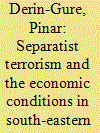|
|
|
Sort Order |
|
|
|
Items / Page
|
|
|
|
|
|
|
| Srl | Item |
| 1 |
ID:
106126


|
|
|
|
|
| Publication |
2011.
|
| Summary/Abstract |
We address empirically the question of why international economic sanctions are, or are not, chosen as instruments of foreign policy and the question of what determines their success. We hypothesize that cultural linkages between nations are an important factor in explaining both instrument choice and conflict outcomes. Countries that share significant cultural attributes are found to be less likely to apply economic sanctions against one another than countries lacking such cultural ties. However, it is precisely in the case of culturally similar sender and target nations that sanctions are most likely to succeed.
|
|
|
|
|
|
|
|
|
|
|
|
|
|
|
|
| 2 |
ID:
106129


|
|
|
|
|
| Publication |
2011.
|
| Summary/Abstract |
This paper looks into the Greek-Turkish arms race a decade after an earlier contribution to the issue that relied heavily on artificial neural networks. The time period between the two papers contributes to the reliability of the results derived, not just by increasing the number of observations, but also mainly by incorporating the progress made in the realm of artificial intelligence. The focus on the case of both countries unlike the paper mentioned above that dealt with just the Greek side provides ample room for comparative purposes regarding the determinants of defense expenditure on both sides. The results derived in terms of input significance estimation support the findings of the earlier research as indicated above, pointing to the leading role of the demographic preponderance of Turkey over Greece. The paper also points to the fact that 10 years later, Turkey continues to set the arms race rules against its rival by determining the defense expenditure of Greece, whereas the role of the latter in affecting the military spending of Turkey is non-existent.
|
|
|
|
|
|
|
|
|
|
|
|
|
|
|
|
| 3 |
ID:
106123


|
|
|
|
|
| Publication |
2011.
|
| Summary/Abstract |
As terror's victims increase, hard currency commitments gain effectiveness in reducing inflation, and central bank independence loses its effectiveness, because terror reduces transparency and the number of veto players in domestic politics. PCSE (Panel-Corrected Standard Error) estimations of inflation are run on pooled cross-section time-series sample of 87 countries from 1975-2005. When the trend level rises to 100 victims annually a currency board reduces inflation by up to 7.5%, and an independent bank raises inflation by up to 8%. When victims exceptionally exceed the trend by 100, a currency board reduces inflation by 2.5%, and an independent bank raises it by 2%.
|
|
|
|
|
|
|
|
|
|
|
|
|
|
|
|
| 4 |
ID:
106127


|
|
|
|
|
| Publication |
2011.
|
| Summary/Abstract |
The main objective of the paper is to decipher the military expenditure-economic growth relationship, taking the level of economic development (income) into consideration. Our findings suggest the following: (i) military expenditure has a significantly negative relationship to economic growth for the 23 countries with initial incomes (threshold variable) less than or equal to $475.93; (ii) when the threat level is heightened, economic growth (23 countries) is expected to decrease. However, military expenditure in the presence of sufficiently large threats increases growth; (iii) for the remaining 69 countries whose initial incomes (real GDP per capita in 1992 price) exceed $475.93, no significant relationship exists whether the threat variable is taken into consideration or not.
|
|
|
|
|
|
|
|
|
|
|
|
|
|
|
|
| 5 |
ID:
106124


|
|
|
|
|
| Publication |
2011.
|
| Summary/Abstract |
This paper investigates the economic roots of separatist terrorism in Turkey. The political conventional wisdom is that poverty in highly Kurdish-populated, south-eastern Turkey is one of the most important causes of separatist terrorism and Turkish-Kurdish conflict in Turkey. Therefore, many economic policies have been implemented to improve the economic conditions in the south-eastern part of the country. Using the Global Terrorism Database and Vector Autoregression (VAR) methodology, I find that there is no causal relationship between economic conditions in south-eastern Turkey and separatist terrorism. Therefore policy-makers should be cautious in using economic measures to prevent separatist terrorism in Turkey.
|
|
|
|
|
|
|
|
|
|
|
|
|
|
|
|
| 6 |
ID:
106125


|
|
|
|
|
| Publication |
2011.
|
| Summary/Abstract |
We study the determinants of social preferences for national defence and for police and law enforcement. For this task, we estimate a bivariate ordered probit model for a set of European countries (France, Finland, Norway, Portugal, Spain and Sweden) in 2006. Determinants of spending decisions for defence and police are found to be linked but are of significantly different magnitudes. Besides, measures against terrorist threats are positively linked to police and defence spending increases, while the subjective perception of fiscal pressure has no influence. Finally, no significant differences are found between Northern and Southern Europe.
|
|
|
|
|
|
|
|
|
|
|
|
|
|
|
|
|
|
|
|
|